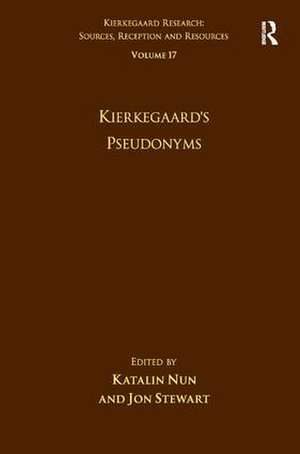Volume 17: Kierkegaard's Pseudonyms: Kierkegaard Research: Sources, Reception and Resources
Autor Katalin Nun, Jon Stewarten Limba Engleză Hardback – 12 mai 2015
| Toate formatele și edițiile | Preț | Express |
|---|---|---|
| Paperback (1) | 397.38 lei 6-8 săpt. | |
| Taylor & Francis – 30 iun 2021 | 397.38 lei 6-8 săpt. | |
| Hardback (1) | 769.69 lei 6-8 săpt. | |
| Taylor & Francis – 12 mai 2015 | 769.69 lei 6-8 săpt. |
Din seria Kierkegaard Research: Sources, Reception and Resources
-
 Preț: 310.71 lei
Preț: 310.71 lei -
 Preț: 386.77 lei
Preț: 386.77 lei - 18%
 Preț: 1055.21 lei
Preț: 1055.21 lei - 18%
 Preț: 1065.78 lei
Preț: 1065.78 lei - 26%
 Preț: 820.71 lei
Preț: 820.71 lei - 18%
 Preț: 1064.19 lei
Preț: 1064.19 lei - 18%
 Preț: 1060.87 lei
Preț: 1060.87 lei - 25%
 Preț: 826.15 lei
Preț: 826.15 lei - 18%
 Preț: 1065.96 lei
Preț: 1065.96 lei -
 Preț: 469.34 lei
Preț: 469.34 lei - 18%
 Preț: 1056.95 lei
Preț: 1056.95 lei - 15%
 Preț: 703.76 lei
Preț: 703.76 lei - 18%
 Preț: 1117.49 lei
Preț: 1117.49 lei - 18%
 Preț: 1054.71 lei
Preț: 1054.71 lei - 18%
 Preț: 1116.27 lei
Preț: 1116.27 lei -
 Preț: 381.28 lei
Preț: 381.28 lei - 26%
 Preț: 765.59 lei
Preț: 765.59 lei - 25%
 Preț: 825.63 lei
Preț: 825.63 lei - 26%
 Preț: 821.13 lei
Preț: 821.13 lei -
 Preț: 469.34 lei
Preț: 469.34 lei - 18%
 Preț: 1061.81 lei
Preț: 1061.81 lei - 18%
 Preț: 1062.31 lei
Preț: 1062.31 lei - 18%
 Preț: 1059.18 lei
Preț: 1059.18 lei - 18%
 Preț: 1059.45 lei
Preț: 1059.45 lei - 18%
 Preț: 1057.75 lei
Preț: 1057.75 lei - 18%
 Preț: 1057.89 lei
Preț: 1057.89 lei -
 Preț: 489.26 lei
Preț: 489.26 lei - 30%
 Preț: 768.82 lei
Preț: 768.82 lei - 18%
 Preț: 1116.77 lei
Preț: 1116.77 lei - 18%
 Preț: 1112.03 lei
Preț: 1112.03 lei - 18%
 Preț: 1067.35 lei
Preț: 1067.35 lei - 18%
 Preț: 1056.00 lei
Preț: 1056.00 lei - 18%
 Preț: 1058.65 lei
Preț: 1058.65 lei - 31%
 Preț: 767.80 lei
Preț: 767.80 lei - 18%
 Preț: 1064.98 lei
Preț: 1064.98 lei - 18%
 Preț: 1058.86 lei
Preț: 1058.86 lei - 26%
 Preț: 820.32 lei
Preț: 820.32 lei - 25%
 Preț: 823.17 lei
Preț: 823.17 lei - 26%
 Preț: 821.94 lei
Preț: 821.94 lei - 28%
 Preț: 821.53 lei
Preț: 821.53 lei - 18%
 Preț: 1060.25 lei
Preț: 1060.25 lei - 18%
 Preț: 1055.84 lei
Preț: 1055.84 lei - 26%
 Preț: 850.73 lei
Preț: 850.73 lei - 18%
 Preț: 1054.71 lei
Preț: 1054.71 lei - 25%
 Preț: 854.26 lei
Preț: 854.26 lei
Preț: 769.69 lei
Preț vechi: 1030.63 lei
-25% Nou
Puncte Express: 1155
Preț estimativ în valută:
147.28€ • 154.18$ • 121.86£
147.28€ • 154.18$ • 121.86£
Carte tipărită la comandă
Livrare economică 05-19 aprilie
Preluare comenzi: 021 569.72.76
Specificații
ISBN-13: 9781472457639
ISBN-10: 1472457633
Pagini: 344
Dimensiuni: 156 x 234 x 26 mm
Greutate: 0.76 kg
Ediția:1
Editura: Taylor & Francis
Colecția Routledge
Seria Kierkegaard Research: Sources, Reception and Resources
Locul publicării:Oxford, United Kingdom
ISBN-10: 1472457633
Pagini: 344
Dimensiuni: 156 x 234 x 26 mm
Greutate: 0.76 kg
Ediția:1
Editura: Taylor & Francis
Colecția Routledge
Seria Kierkegaard Research: Sources, Reception and Resources
Locul publicării:Oxford, United Kingdom
Cuprins
Contents: Preface; ‘A’ the aesthete: aestheticism and the limits of philosophy, Ryan Kemp; A, B, and A. F…: Kierkegaard’s use of anonyms, Joseph Westfall; Anti-Climacus: Kierkegaard’s ‘servant of the word’, Jakub Marek; Constantin Constantius: the activity of a travelling esthetician and how he still happened to pay for the dinner, Gabriel Guedes Rossatti; Frater Taciturnus: the two lives of the silent brother, Wojciech Kaftanski and Gabriel Guedes Rossatti; H.H.: a guerrilla writer after theologians…and more, Paul Martens; Hilarius Bookbinder: the realm of truth and the world of books, Elisabete M. de Sousa; Inter et inter: between actress and critic, Joseph Westfall; Johannes Climacus: humorist, dialectician, and gadfly, Lee C. Barrett; Johannes de silentio: religious poet or faithless aesthete? Ryan Kemp; Johannes the Seducer: the aesthete par excellence or on the way to ethics?, Nathaniel Kramer; Judge William: the limits of the ethical, Patricia C. Dip; Nicolaus Notabene: Kierkegaard’s satirical mask, Nassim Bravo Jordán; The one still living: life-view, nihilism, and religious experience, Matthew Brake; Petrus Minor: a lowly and insignificant ministering critic, Thomas J. Millay; Quidam: earnest for ten minutes a week, Mariana Alessandri; Victor Eremita: a diplomatic yet abstruse editor, Joaquim Hernandez-Dispaux; Vigilius Haufniensis: psychological sleuth, anxious author, and inadvertent evangelist, Lee C. Barrett; William Afham: the line by which an ape may become an apostle, Mariana Alessandri; Young man: voice of naïveté, Jochen Schmidt; Indexes.
Notă biografică
Katalin Nun and Jon Stewart are both based in the Kierkegaard Research Centre at the University of Copenhagen, Denmark.
Descriere
One of the elements that many readers admire in Kierkegaard’s skill as a writer is his ability to create different voices and perspectives in his works. The present volume is dedicated to exploring the different pseudonyms and authorial voices in Kierkegaard’s writing. The articles featured here try to explore each pseudonymous author as a literary figure and to explain what kind of a person is at issue in each of the pseudonymous works. The hope is that by taking seriously each of these figures as individuals, we will be able to gain new insights into the texts which they are ostensibly responsible for.
